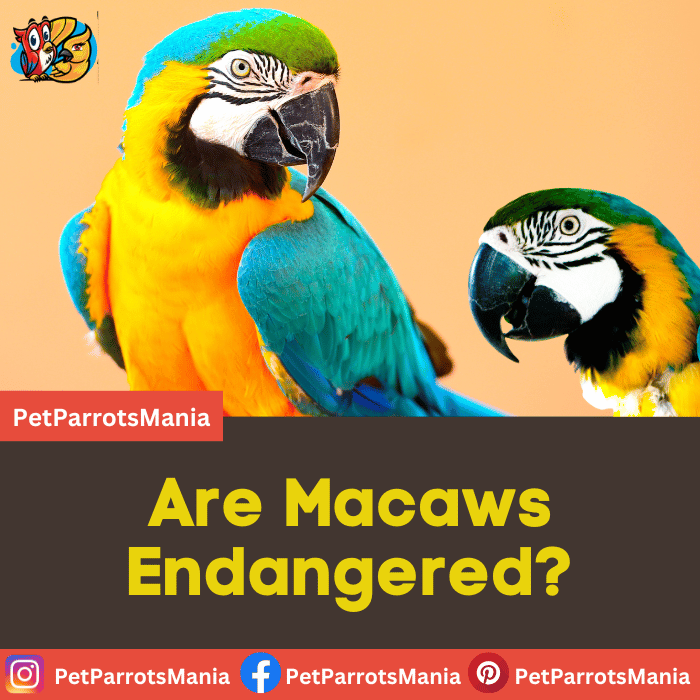Last Updated on May 28, 2023
The world is full of fascinating and beautiful birds and animals. All these birds and animals beautify nature and are essential to the ecosystem and the food chain. Unfortunately, animals and birds face many threats to their survival, including macaws. So the question arises, are macaws endangered?
Macaws are one of the most beautiful and intelligent birds in the world. They are famous for their beautiful colors, playful personalities, and impressive vocal and imitative abilities. Unfortunately, macaws are also endangered, with many species threatened with extinction.
According to the International Union for Conservation of Nature (IUCN), 11 out of 17 macaw species are considered or critically endangered. This means that more than half of all macaw species are at risk of becoming extinct forever. This article will explore why macaws are endangered and what can be done to protect them.
Why are Macaws Endangered?
Macaws have been famous pets for many years, but their population has rapidly declined over the past few decades. The most obvious reason for this is severe habitat loss. Macaws need large forest areas to survive, but deforestation and other human activities have destroyed much of their natural habitat. Additionally, macaws have been captured for their feathers and pet trade.
What are the Threats to Macaws?
Macaws today face several threats, such as habitat loss, human activities, food availability, climate change, illegal pet trade, poaching, predation, and disease.
Habitat loss
Macaws are inhabitants of the lush rainforests, forests, and savannas of the Amazon and Brazil. Tropical forests are rapidly being destroyed. Habitat loss is one of the biggest threats macaws face. Severe deforestation of farmland and urbanization has destroyed much of their natural habitat, leaving them with fewer places to live and breed. This led to a decrease in population and an increased risk of extinction.
Human Activities
Human activities such as logging, mining, agriculture, and urbanization have also contributed to the decline of macaw populations. These activities destroy forests and other natural habitats that macaws depend on for food and shelter. Additionally, human activities can lead to pollution and other environmental issues that can harm macaws and other wildlife.
Food Availability:
Food availability plays a vital role in the survival and reproduction of macaws. These birds depend on specific food sources, such as fruits, nuts, seeds, flowers, and smaller insects, which vary depending on their habitat. Deforestation, habitat degradation, and changes in land use patterns have significantly impacted the availability of these essential food resources, reducing reproductive success and decreasing their population.
Climate Change:
Climate change is another major threat to macaw populations. Changes in temperature, precipitation patterns, and extreme weather conditions affect food sources’ availability, distribution, and phenology. Changes in flowering and fruiting seasons can cause asynchrony between macaw breeding cycles and food availability, which impacts breeding success and overall population dynamics.
Illegal pet trade
The illegal pet trade is another major threat to macaws. Many people want to own macaws as pets because of their beauty and intelligence, but capturing wild macaws for the pet trade is illegal and harmful to birds. Captured macaws are often abused and kept in small cages, leading to health issues and a shortened lifespan.
Poaching and smuggling
Poaching and smuggling of macaws are also a problem in many parts of the world. Macaws are hunted for their feathers, meat, and other body parts sold on the black market. Additionally, some people capture wild macaws and smuggle them across borders to sell as pets.
Predation
Predation is another threat to macaws. Macaws have natural predators such as snakes, birds of prey, and mammals that can kill them or steal their eggs. Additionally, introduced predators such as rats and cats can also harm macaw populations.
Diseases
Diseases are another threat to macaws. Like all animals, macaws are susceptible to various diseases that can be spread through contact with other animals or contaminated food or water sources. Certain diseases can be fatal to macaws or cause long-term health problems.
Conclusion
Macaws are one of the most beautiful and intelligent birds in the world. Yet they are also threatened due to habitat loss, human activities, illegal pet trade, poaching and smuggling, predation, and disease. We must protect these amazing birds before it’s too late. This can be done through conservation efforts such as habitat restoration, anti-poaching measures, education campaigns, and enforcement of laws against the illegal pet trade.

